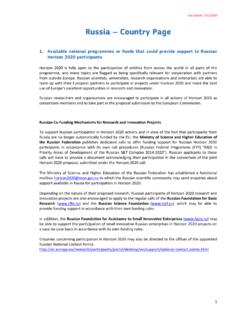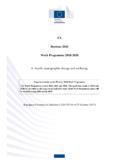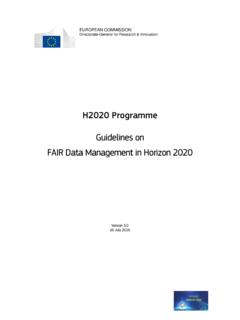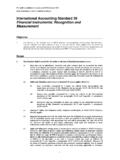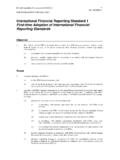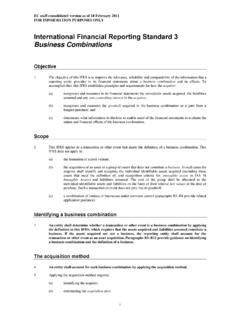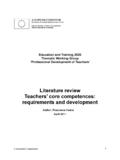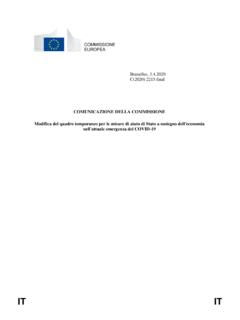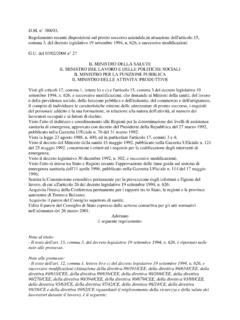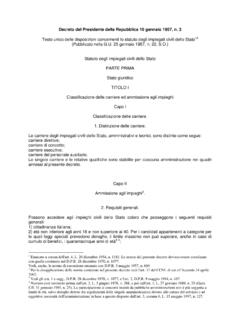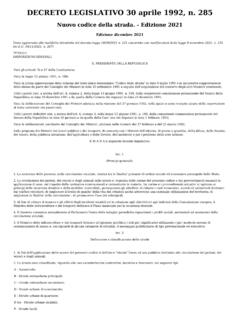Transcription of EN - European Commission
1 EN EN European Commission Brussels, C(2020) 1863 final COMMUNICATION FROM THE Commission Temporary Framework for State aid measures to support the economy in the current COVID-19 outbreak 1 1. THE COVID-19 OUTBREAK, ITS IMPACT ON THE ECONOMY AND THE NEED FOR TEMPORARY MEASURES The COVID-19 outbreak and its impact on the economy 1. The COVID-19 outbreak is a severe public health emergency for citizens and societies, with infections in all the Union s Member States. It is also a major shock to the global and Union s economies and a coordinated economic response of Member States and EU institutions is crucial to mitigate these negative repercussions on the EU economy. 2. This shock is affecting the economy through different channels. There is a supply shock resulting from the disruption of supply chains, there is a demand shock caused by lower consumer demand and there is the negative effect of uncertainty on investment plans and the impact of liquidity constraints for undertakings.
2 3. The various containment measures adopted by the Member States, such as social distancing measures, travel restrictions, quarantines and lock downs are intended to ensure that the shock is as short and limited as possible. These measures have an immediate impact on both demand and supply, and hit undertakings and employees, especially in the health, tourism, culture, retail and transport sectors. Beyond the immediate effects on mobility and trade, the COVID-19 outbreak is also increasingly affecting undertakings in all sectors and of all kinds, small and medium enterprises ('SMEs') as well as large undertakings. The impact is also felt on global financial markets, in particular with concerns for liquidity. These effects will not be contained to one particular Member State and they will have a disruptive impact on the economy of the Union as a whole.
3 4. In the exceptional circumstances created by the COVID-19 outbreak, undertakings of all kinds may face a severe lack of liquidity. Solvent or less solvent undertakings alike may face a sudden shortage or even unavailability of liquidity. SMEs are at particular risk. This can therefore seriously affect the economic situation of many healthy undertakings and their employees in the short and medium term, while having also longer-lasting effects by endangering their survival. 5. Banks and other financial intermediaries have a key role to play in dealing with the effects of the COVID-19 outbreak, by maintaining the flow of credit to the economy. If the flow of credit is severely constrained, economic activity will decelerate sharply, as undertakings struggle to pay their suppliers and employees. Against this background, it is appropriate that Member States can take measures to incentivise credit institutions and other financial intermediaries to continue to play their role in continuing supporting economic activity in the EU.
4 6. Aid granted by Member States under Article 107(3)(b) TFEU under this Communication to undertakings, which is channelled through banks as financial intermediaries, benefits those undertakings directly. Such aid does not have the objective to preserve or restore the viability, liquidity or solvency of banks. Similarly, aid granted by Member States to banks under Article 107(2)(b) TFEU to compensate for direct damage suffered as a result of the COVID-19 outbreak1 does not have the objective to preserve or restore the viability, liquidity or solvency of an institution or entity. As a result, such aid would not be qualified as extraordinary public financial support under the Directive 2014/59/EU of 1 Such aid must be notified by Member States and the Commission will assess it under Article 107(2)(b) TFEU. 2 the European Parliament and of the Council (the BRRD)2 nor under the Regulation 806/2014 of the European Parliament and of the Council (the SRM Regulation)3, and would also not be assessed under the State aid rules 4 applicable to the banking 7.
5 If due to the COVID-19 outbreak, banks would need direct support in the form of liquidity recapitalisation or impaired asset measure, it will have to be assessed whether the measure meets the conditions of Article 32(4)(d) (i), (ii) or (iii) of the BRRD. Where the latter conditions were to be fulfilled, the bank receiving such direct support would not be deemed to be failing-or-likely-to-fail. To the extent such measures address problems linked to the COVID-19 outbreak, they would be deemed to fall under point 45 of the 2013 Banking Communication6, which sets out an exception to the requirement of burden-sharing by shareholders and subordinated creditors. 8. Undertakings may not only face insufficient liquidity, but they may also suffer significant damage because of the COVID-19 outbreak. The exceptional nature of the COVID-19 outbreak means that such damages could not have been foreseen, are of a significant scale and hence put undertakings in conditions that sharply differ from the market conditions in which they normally operate.
6 Even healthy undertakings, well prepared for the risks inherent to the normal course of business, can struggle in these exceptional circumstances, to such an extent that their viability may be undermined. 9. The COVID-19 outbreak poses the risk of a serious downturn affecting the whole economy of the EU, hitting businesses, jobs and households. Well-targeted public support is needed to ensure that sufficient liquidity remains available in the markets, to counter the damage inflicted on healthy undertakings and to preserve the continuity of economic activity during and after the COVID-19 outbreak. Given the limited size of the EU budget, the main response will come from Member States national budgets. EU State aid rules enable Member States to take swift and effective action to support citizens and undertakings, in particular SMEs, facing economic difficulties due to the COVID-19 outbreak.
7 2 OJ L 173, , p. 190 348. 3 OJ L 225, , Article 3 (1)(29) of the SRM Regulation. 4 Communication on the recapitalisation of financial institutions in the current financial crisis: limitation of aid to the minimum necessary and safeguards against undue distortions of competition ("Recapitalisation Communication") (OJ C 10, , p. 2), Communication from the Commission on the treatment of impaired assets in the Community financial sector ("Impaired Assets Communication") (OJ C 72, , p. 1), Communication on the return to viability and the assessment of restructuring measures in the financial sector in the current crisis under the State aid rules ("Restructuring Communication") (OJ C 195, , p. 9), Communication from the Commission on the application, from 1 January 2011, of State aid rules to support measures in favour of financial institutions in the context of the financial crisis ("2010 Prolongation Communication") (OJ C 329, , p.)
8 7), Communication from the Commission on the application, from 1 January 2012, of State aid rules to support measures in favour of financial institutions in the context of the financial crisis ("2011 Prolongation Communication") (OJ C 356, , p. 7), Communication from the Commission on the application, from 1 August 2013, of State aid rules to support measures in favour of banks in the context of the financial crisis ("2013 Banking Communication") (OJ C 216, , p. 1). 5 Any measures to support credit institutions or other financial institutions that constitute State aid in the meaning of Article 107(1) TFEU, which fall outside the present Communication or are not covered by Article 107(2)(b) TFEU must be notified to the Commission and shall be assessed under the State aid rules applicable to the banking sector. 6 Communication from the Commission on the application, from 1 August 2013 , of State aid rules to support measures in favour of banks in the context of the financial crisis, OJ C 216, , p.
9 1 15. 3 The need for close European coordination of national aid measures 10. Targeted and proportionate application of EU State aid control serves to make sure that national support measures are effective in helping the affected undertakings during the COVID-19 outbreak but also that they allow them to bounce back from the current situation, keeping in mind the importance of meeting the green and digital twin transitions in accordance with EU objectives. Likewise, EU State aid control ensures that the EU Internal Market is not fragmented and that the level playing field stays intact. The integrity of the Internal Market will also lead to a faster recovery. It also avoids harmful subsidy races, where Member States with deeper pockets can outspend neighbours to the detriment of cohesion within the Union. The need for appropriate State aid measures 11. In the overall effort of Member States to tackle the effects of the COVID-19 outbreak on their economy, this Communication sets out the possibilities Member States have under EU rules to ensure liquidity and access to finance for undertakings, especially SMEs that face a sudden shortage in this period in order to allow them to recover from the current situation.
10 12. The Commission set out in the Communication on a Coordinated economic response to the COVID-19 outbreak of 13 March 20207 the various options available to Member States outside the scope of EU State aid control and which they may put in place without the involvement of the Commission . These include measures applicable to all undertakings regarding wage subsidies, suspension of payments of corporate and value added taxes or social welfare contributions, or financial support directly to consumers for cancelled services or tickets not reimbursed by the concerned operators. 13. Member States can also design support measures in line with the General Block Exemption Regulation8 without the involvement of the Commission . 14. In addition, on the basis of Article 107(3)(c) TFEU and as further specified in the Rescue and Restructuring State aid Guidelines, Member States can notify to the Commission aid schemes to meet acute liquidity needs and support undertakings facing financial difficulties, also due to or aggravated by the COVID-19 outbreak9.
